A Discipling Community: Spiritual Formation from the Church to the Classroom
Chad Burchett | February 17, 2023
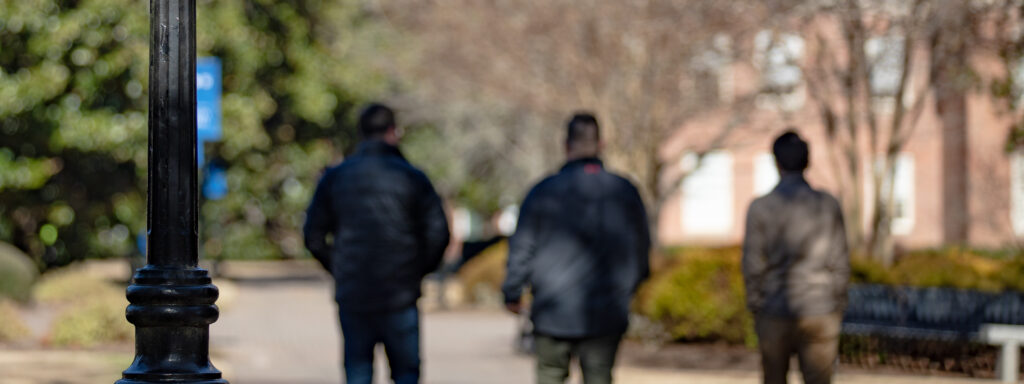
Although Tate Griffiths, Justin Myers, and Dalton Kaiser grew up in different hometowns in Texas, they each enrolled at Dallas Baptist University within a few years of one another. One by one, they each became members of the same local church, First Baptist Church Irving, where they met and began what would become a lasting friendship. It was also at FBC Irving that they would learn the value of a vibrant discipling community and develop a desire for further theological education at Southeastern.
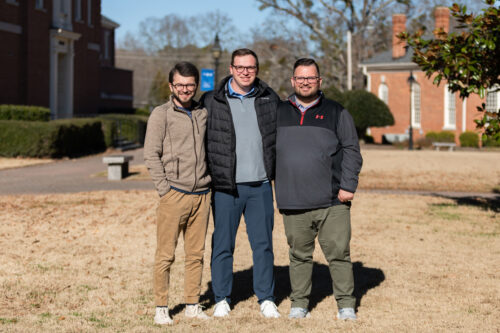 Tate did not grow up in the church. So, when he encountered the discipling community at FBC Irving, it completely changed the way he approached life in the local church.
Tate did not grow up in the church. So, when he encountered the discipling community at FBC Irving, it completely changed the way he approached life in the local church.
“When I started going to FBC Irving, I began to learn what community in the body looks like — community among all generations and not just in the college ministry,” added Tate. “It was there that I developed a love for God’s word as my church family intentionally discipled me. Being exposed to that for the first time showed me how little I knew and fueled my desire to pursue further theological training. The discipleship I experienced at church was a major reason why I ended up at Southeastern.”
The discipleship I experienced at church was a major reason why I ended up at Southeastern.
Shaped by the community at FBC Irving, Tate, Justin, and Dalton learned the value of cultivating a discipleship culture that prioritizes gospel intentionality in the everyday rhythms of life. These simple everyday acts of Christian community became extraordinary tools for spiritual formation: life-on-life community as sanctification and ministry preparation.
“Our church instilled in us a commitment and love for the local church,” shared Dalton. “Similarly to how the early church would break bread together, meet together, and attend the synagogues together in Acts 2, we were always together, sharing dinner, talking and hanging out late together, and even praying and singing together.”
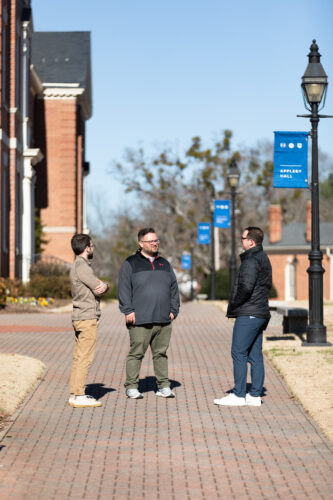 Because they were living in Irving — one of the most diverse cities in the country — Tate, Justin and Dalton had regular opportunities to engage cross culturally. God used this diverse context to expand their view of missions, which helped them develop habits of gospel intentionality — habits that would continue into seminary.
Because they were living in Irving — one of the most diverse cities in the country — Tate, Justin and Dalton had regular opportunities to engage cross culturally. God used this diverse context to expand their view of missions, which helped them develop habits of gospel intentionality — habits that would continue into seminary.
“We had opportunities to regularly evangelize together and navigate cross-cultural barriers with the gospel,” noted Dalton. “Our outreach groups would engage the local community college, and the harvest fields of mission and evangelism were always on our minds. It was a blessing to have those opportunities together.”
While living in community and serving on mission together, Tate, Justin, and Dalton developed a desire for further training — training to help local churches develop lasting cultures of discipleship like the one they had experienced at FBC Irving.
Over the years, several of their leaders and church members had attended Southeastern for training, so when it came time to choose a seminary, they were already well-acquainted with Southeastern’s mission to serve the Church and fulfill the Great Commission. They were also drawn to Southeastern’s faculty and community who clearly loved the Church and God’s mission in the world.
For Justin what solidified his decision to attend Southeastern was his glimpse into Southeastern’s community and the friendliness of the faculty. During an early visit to Southeastern, Justin tweeted Stephen Eccher, a church history professor at Southeastern, and to Justin’s surprise, Eccher responded.
“I sent Dr. Eccher a message saying, ‘I love the Reformation and my family is on campus today. Can I meet with you?’” recounted Justin. “Dr. Eccher told me to swing by his office right then, and he met with me for two hours. What struck me then was his openness to students. He dropped everything just to talk with a random guy from Twitter.”
“The reason we ultimately moved here was so that we could interact with professors like Dr. Eccher and learn alongside other students in community,” noted Justin. “Praise God, we’ve been able to do just that, and we’ve even been able to enjoy this season with some friends we already knew before we arrived.”
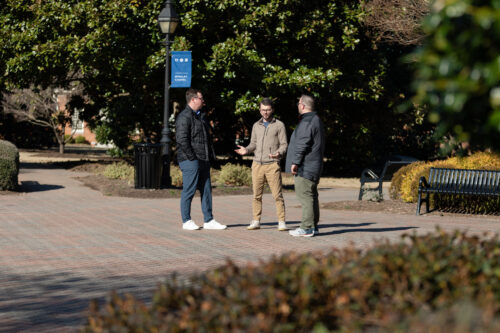 Starting in spring of 2021, Tate, Justin, and Dalton each moved to Southeastern one by one, and in God’s providence, their friendship thrived in the Southeastern community.
Starting in spring of 2021, Tate, Justin, and Dalton each moved to Southeastern one by one, and in God’s providence, their friendship thrived in the Southeastern community.
As soon as they settled into campus housing, Dalton and his wife McKinley began to open their home to community — just as they had learned to do at FBC Irving. This hospitality became a catalyst for discipleship and further community.
“When we arrived, Dalton and McKinley would open their house almost every week for us and others to come over and hang out,” shared Justin. “They still do, and that’s been a way for us to further cultivate our friendships.”
Justin and his wife Kasey have been encouraged, in turn, to open their home and pursue intentional hospitality not only because of Dalton and McKinley’s influence but also because of the hospitality they have experienced in their Southeastern neighborhood. By hosting dinners for members of their church and for fellowship in the neighborhood, Justin and Kasey have learned what it means to be a part of the Southeastern community.
Being folded into these experiences has been formative for Tate as well, who is now leveraging his apartment and his time as a single student to practice hospitality and community like he learned from his friends.
“I have learned so much from doing life with these guys and their families,” added Tate. “Seeing how they love their wives, raise their children, and practice hospitality has been a huge encouragement to me. Through their examples, I’ve learned the importance of hospitality, in conjunction with my theological training, for making disciples in any context.”
I’ve learned the importance of hospitality, in conjunction with my theological training, for making disciples in any context.
These mutually discipling relationships are not only the result of their proximity in Southeastern housing but also their intentionality to invest in one another. For Tate, Justin, and Dalton, this intentionality includes everyday practices like regular walks to check in and sharpen one another.
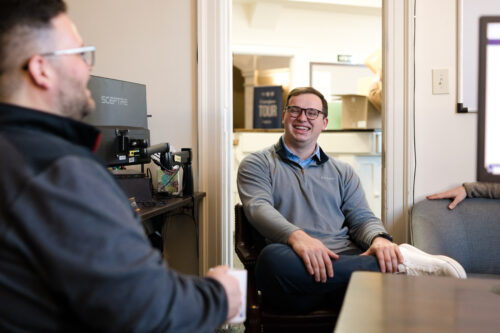 “At least once a week, the three of us make an effort to go on a walk together, which has become a super practical way of seeing how each other is doing,” commented Tate. “It keeps us intentional to hold each other accountable and encourage one another throughout the week.”
“At least once a week, the three of us make an effort to go on a walk together, which has become a super practical way of seeing how each other is doing,” commented Tate. “It keeps us intentional to hold each other accountable and encourage one another throughout the week.”
Discipling friendships in the Southeastern community shape all of life, as Tate, Justin, and Dalton attested. The effects of their intentional friendship extend even to their studies and has shaped the way they think about the purpose of their theological education.
“Some of the best arguments and applications that I’ve written for an assignment have been things that I’ve talked out with these guys while hanging out or on a walk,” shared Dalton. “We are able to flesh out what we’re learning and reading together, which has been so helpful along the way.”
“Because of my experience of community with these guys, I am regularly reminded that education should be formative,” noted Justin. “Seminary is not just about learning facts; seminary is supposed to be formative for your whole person. Studying and talking things through with these guys sharpens me. Together, we bounce ideas off each other, and even more importantly, push each other toward personal holiness. Being with them and being a part of Southeastern’s community has truly made moving to campus particularly formative and worth it.”
Being with them and being a part of Southeastern’s community has truly made moving to campus particularly formative and worth it.
As members now of the same local church in Raleigh, Tate, Justin, and Dalton have also been able to leverage their friendships to build ministry connections with new families at their church and in the area.
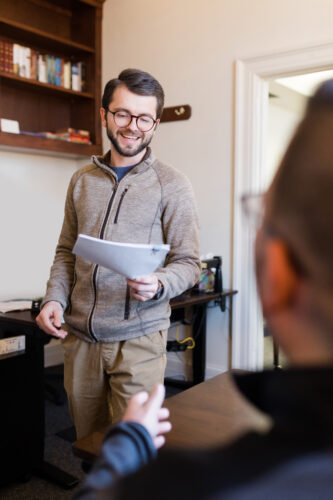 “Because we also all go to the same church, we are able to do community together in that context as well,” noted Justin. “As one of us gets to know a new family at church or internationals who have moved to the area, we are able to loop them into our hangouts together.”
“Because we also all go to the same church, we are able to do community together in that context as well,” noted Justin. “As one of us gets to know a new family at church or internationals who have moved to the area, we are able to loop them into our hangouts together.”
“I’ve been reminded lately that hospitality is a requirement for being an elder in the New Testament,” added Justin. “Through our friendship, I’ve learned what that can look like in the neighborhood and in the church. This is a really sweet place to see examples of that and learn how to embody that requirement even before serving as an elder.”
These overlapping layers of discipling community have also profoundly shaped how Tate, Justin, and Dalton think about the Great Commission and their role in fulfilling that mission. For Justin, he has been gripped by the communal nature of the Great Commission as the mission of the Church — and not merely the individual Christian.
“While I’ve been here, I’ve really grown in my understanding of the importance of the local church in the Great Commission,” shared Justin. “The command is to make disciples, and the church is supposed to do that. Southeastern is training pastors to serve the local church and, as the church, fulfill the Great Commission.”
Southeastern is training pastors to serve the local church and, as the church, fulfill the Great Commission.
For Dalton, his experience of community and his training at Southeastern has reminded him that the Great Commission cannot be fulfilled at arm’s length. Rather, it requires gospel intentionality and sacrificial love.
“I’ve come to realize that the command of the Great Commission is to make disciples, which includes teaching them all that Jesus has commanded,” noted Dalton. “That requires being involved in each other’s lives. It requires intentional personal relationships. It requires sacrifice.”
Through life in the Southeastern community, Tate, Justin, and Dalton have learned the importance of intentional discipleship relationships like the one they enjoy with each other. Shaped by a sending church that valued intentional community and discipleship, they are now leveraging their friendship and shared vision for community to live every day on mission.